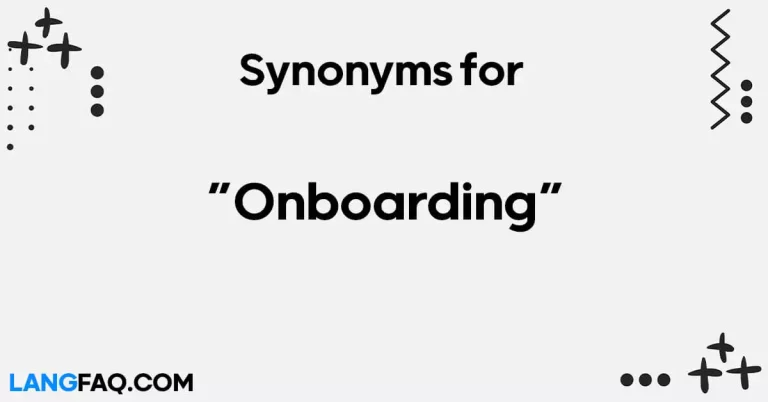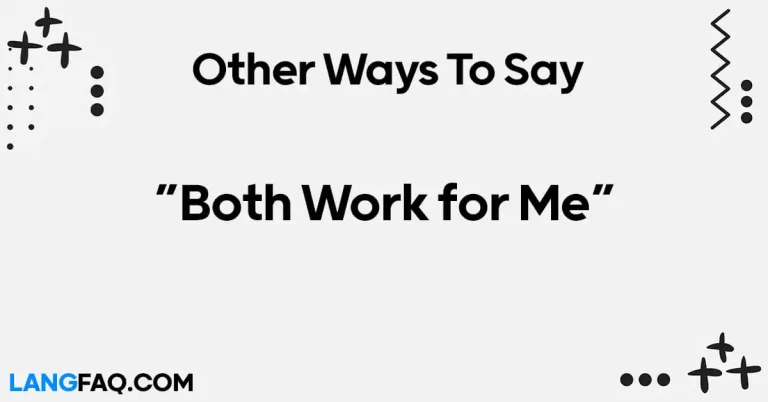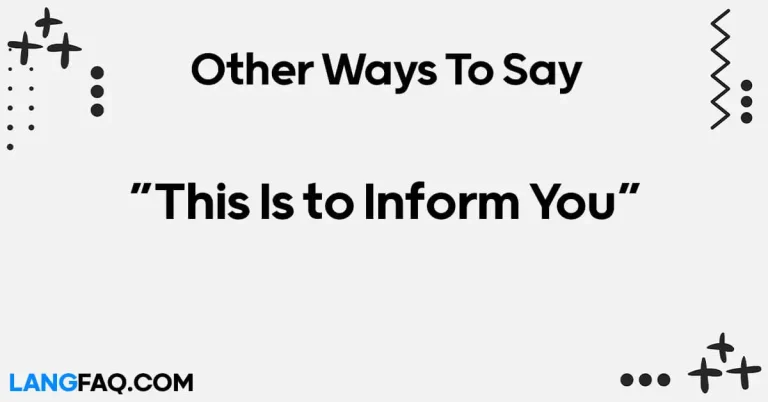Communication is a crucial aspect of our daily lives, and finding diverse ways to express ourselves politely is essential. In this article, we delve into “12 Other Ways to Say ‘Please Let Me Know if Otherwise.'” Enhance your language skills, boost your professional communication, and explore various expressions that can elevate your conversations.
12 Other Ways to Say “Please Let Me Know if Otherwise”
Here are 12 alternative ways to express “Please Let Me Know if Otherwise”:
- Kindly inform me if there’s a different perspective.
- Feel free to share any alternative viewpoints.
- Notify me should there be another point of view.
- I’m open to hearing your thoughts on the matter.
- Keep me posted if there’s a different stance.
- Should you have a different opinion, please share.
- I welcome any alternative insights you may have.
- Inform me if there’s an alternative standpoint.
- Please communicate if there’s another viewpoint.
- Feel free to let me know if you think differently.
- Notify me of any alternative perspectives.
- Should there be a different outlook, inform me.
Here’s a table with meanings and examples for the 12 alternatives to “Please Let Me Know if Otherwise”:
| Expression | Meaning | Example |
|---|---|---|
| Kindly inform me if there’s a different perspective. | Politely ask for alternative viewpoints. | “Kindly inform me if there’s a different perspective on this issue.” |
| Feel free to share any alternative viewpoints. | Encourage open communication for diverse opinions. | “Feel free to share any alternative viewpoints you may have.” |
| Notify me should there be another point of view. | Request a notification if there’s a different stance. | “Please notify me should there be another point of view.” |
| I’m open to hearing your thoughts on the matter. | Express openness to receiving alternative thoughts. | “I’m open to hearing your thoughts on the matter, so please feel free to share.” |
| Keep me posted if there’s a different stance. | Ask to be kept informed of any alternative positions. | “Keep me posted if there’s a different stance on this issue.” |
| Should you have a different opinion, please share. | Politely request the sharing of differing opinions. | “Should you have a different opinion, please share it with us.” |
| I welcome any alternative insights you may have. | Express a welcoming attitude toward different perspectives. | “I welcome any alternative insights you may have regarding this topic.” |
| Inform me if there’s an alternative standpoint. | Request information about any alternative standpoint. | “Inform me if there’s an alternative standpoint that needs consideration.” |
| Please communicate if there’s another viewpoint. | Politely ask for communication about different viewpoints. | “Please communicate if there’s another viewpoint that should be discussed.” |
| Feel free to let me know if you think differently. | Encourage open expression of different thoughts. | “Feel free to let me know if you think differently about this matter.” |
| Notify me of any alternative perspectives. | Request notification about any alternative perspectives. | “Notify me of any alternative perspectives that should be considered.” |
| Should there be a different outlook, inform me. | Ask to be informed in case of a different outlook. | “Should there be a different outlook, please inform me promptly.” |
These alternative expressions provide a versatile toolkit for politely requesting diverse perspectives. Whether you’re open to hearing different thoughts or actively seeking alternative viewpoints, these phrases offer flexibility in communication while maintaining a courteous tone.
Is It Correct to Say “Please Let Me Know if Otherwise”?
The phrase “Please let me know if otherwise” is grammatically correct but may sound a bit formal or old-fashioned in contemporary English. It’s often used in written communication, especially in business or professional settings, to request clarification or confirmation regarding a previous statement or decision.
In modern language, there are alternative ways to express a similar sentiment, making the communication more straightforward and concise. For example:
- If you have a different perspective, please share.
- Feel free to let me know if you think differently.
- I’m open to hearing your thoughts on the matter.
- Notify me should there be another point of view.
These alternatives maintain politeness while using more commonly used and direct language. The choice between phrases depends on the context, relationship with the recipient, and the level of formality required in the communication.
Professional Mail Example With “Please Let Me Know if Otherwise”
Subject: Confirmation Required for Upcoming Project Meeting
Dear [Recipient’s Name],
I trust this email finds you well. As we approach the scheduled date for our project kick-off meeting on [date] at [time], I would like to confirm your availability and readiness for the session.
The agenda includes discussing the project timeline, allocation of responsibilities, and outlining our communication strategy. Your input on these matters is crucial to ensure the success of our project.
Please let me know if otherwise, or if you have any scheduling conflicts preventing your attendance. Additionally, if there are specific points you’d like to address during the meeting, feel free to share them in advance.
Your prompt response will be highly appreciated as we aim to make this session productive for all involved.
Thank you in advance for your cooperation.
Best regards,
[Your Full Name] [Your Position] [Your Company] [Your Contact Information]
1. Kindly Inform Me if There’s a Different Perspective.
In various professional settings, expressing openness to alternative perspectives is crucial for fostering collaboration. The phrase “Kindly inform me if there’s a different perspective” combines politeness with a clear request for input. This is suitable for formal communication, especially when dealing with colleagues or superiors.
Example Sentence:
- “Dear Team, as we discuss the upcoming project, kindly inform me if there’s a different perspective on our approach to ensure a comprehensive strategy.”
Variations:
- Colleagues: “If any of you have a different perspective, feel free to share.”
- Mentor-Mentee: “In our mentoring sessions, kindly inform me if there’s a different perspective you’d like to explore.”
Email Sample:
Subject: Seeking Your Input on Project Strategy
Dear [Recipient],
I hope this email finds you well. As we delve into planning the upcoming project, your insights and perspectives are highly valued. Kindly inform me if there’s a different perspective you’d like to contribute. Your input will contribute significantly to the success of our strategy.
Looking forward to hearing your thoughts.
Best regards, [Your Name]
2. Feel Free to Share Any Alternative Viewpoints.
Creating an atmosphere that encourages open communication is vital for effective teamwork. The phrase “Feel free to share any alternative viewpoints” emphasizes the freedom to express diverse opinions, making it suitable for both formal and informal contexts.
Example Sentence:
- “Team, as we brainstorm ideas for the marketing campaign, feel free to share any alternative viewpoints to ensure we explore all creative possibilities.”
Variations:
- Friends: “In our friend group, feel free to share any alternative viewpoints on our weekend plans.”
- Professional Networking: “During the networking event, feel free to share any alternative viewpoints on the industry trends.”
Email Sample:
Subject: Collaboration on Marketing Campaign Ideas
Hi [Recipient],
I hope this email finds you in good spirits. Our team is gearing up for the upcoming marketing campaign, and your insights are invaluable. Feel free to share any alternative viewpoints or creative ideas you may have during our next meeting.
Looking forward to a collaborative session.
Best regards, [Your Name]
3. Notify Me Should There Be Another Point of View.
In more formal contexts, especially in professional environments, the phrase “Notify me should there be another point of view” conveys a sense of formality while requesting timely communication of differing opinions.
Example Sentence:
- “Dear Team, as we finalize the budget proposal, please notify me should there be another point of view on the financial projections.”
Variations:
- Colleagues: “In our departmental meeting, please notify me should there be another point of view on the quarterly goals.”
- Client Communication: “During our client presentation, please notify me should there be another point of view on the proposed strategy.”
Email Sample:
Subject: Finalizing Budget Proposal – Your Input Needed
Dear [Recipient],
I trust this message finds you well. As we approach the finalization of our budget proposal, your insights are critical. Please notify me should there be another point of view on the financial projections. Your expertise is highly valued in this process.
Looking forward to your contribution.
Best regards, [Your Name]
4. I’m Open to Hearing Your Thoughts on the Matter.
In both professional and casual settings, expressing openness to others’ thoughts fosters a collaborative atmosphere. The phrase “I’m open to hearing your thoughts on the matter” combines a welcoming tone with a clear invitation for input, suitable for diverse contexts.
Example Sentence:
- “During our team meeting, I’m open to hearing your thoughts on the matter of improving our workflow efficiency.”
Variations:
- Casual Setting: “As friends, I’m open to hearing your thoughts on the matter of our next travel destination.”
- Cross-Department Collaboration: “In our inter-departmental meeting, I’m open to hearing your thoughts on the matter of optimizing our processes.”
Email Sample:
Subject: Seeking Your Input on Workflow Optimization
Hi [Recipient],
I trust you’re doing well. As we aim to enhance our workflow efficiency, I’m open to hearing your thoughts on the matter during our upcoming team meeting. Your input is crucial to our collective success.
Looking forward to our discussion.
Best regards, [Your Name]
5. Keep Me Posted if There’s a Different Stance.
When working on projects or initiatives, staying informed about varying opinions is key. The phrase “Keep me posted if there’s a different stance” conveys a request for ongoing communication, ensuring everyone is on the same page.
Example Sentence:
- “As we proceed with the product development, please keep me posted if there’s a different stance on the market trends.”
Variations:
- Project Collaboration: “In our project updates, please keep me posted if there’s a different stance on the project timeline.”
- Friendship Dynamics: “In our group plans, please keep me posted if there’s a different stance on the weekend activities.”
Email Sample:
Subject: Project Development Updates – Your Involvement Needed
Dear [Recipient],
I hope this email finds you in good spirits. As we navigate the product development phase, your insights are vital. Please keep me posted if there’s a different stance or any updates on the market trends. Your active involvement is greatly appreciated.
Looking forward to our continued collaboration.
Best regards, [Your Name]
6. Should You Have a Different Opinion, Please Share.
In professional contexts, expressing receptivity to different opinions is a sign of effective leadership. The phrase “Should you have a different opinion, please share” communicates a sense of respect for diverse perspectives, making it suitable for team dynamics.
Example Sentence:
- “In our strategy meeting, should you have a different opinion on the market analysis, please share it for a more comprehensive understanding.”
Variations:
- Project Management: “During our project review, should you have a different opinion on the milestones, please share your insights.”
- Mentorship: “In our mentor-mentee discussions, should you have a different opinion on career choices, please share your thoughts.”
Email Sample:
Subject: Request for Your Opinion on Market Analysis
Hi [Recipient],
I trust you’re well. As we delve into the market analysis in our upcoming strategy meeting, your perspective is crucial. Should you have a different opinion, please share it during our discussion. Your insights will greatly contribute to our strategic decisions.
Looking forward to your input.
Best regards, [Your Name]
7. I Welcome Any Alternative Insights You May Have.
Encouraging a culture of innovation involves welcoming alternative insights. The phrase “I welcome any alternative insights you may have” conveys openness and appreciation for diverse viewpoints, making it suitable for brainstorming sessions or creative discussions.
Example Sentence:
- “In our brainstorming session, I welcome any alternative insights you may have on revamping our marketing strategies.”
Variations:
- Creative Team Meetings: “In our creative team discussions, I welcome any alternative insights you may have on our upcoming project.”
- Academic Collaborations: “During our research collaboration, I welcome any alternative insights you may have on interpreting the data.”
Email Sample:
Subject: Collaboration on Marketing Strategy Revamp
Dear [Recipient],
I hope this message finds you well. As we gather for our upcoming brainstorming session on revamping our marketing strategies, I welcome any alternative insights you may have. Your creativity and unique perspectives are highly valued in this process.
Looking forward to a fruitful discussion.
Best regards, [Your Name]
8. Inform Me If There’s an Alternative Standpoint.
In professional scenarios, clarity is key to effective decision-making. The phrase “Inform me if there’s an alternative standpoint” ensures that you stay informed of differing perspectives, promoting transparency and comprehensive understanding.
Example Sentence:
- “During our board meeting, inform me if there’s an alternative standpoint on the proposed budget allocations.”
Variations:
- Corporate Collaborations: “In our corporate discussions, inform me if there’s an alternative standpoint on the merger proposal.”
- Educational Committees: “Within our academic committee, inform me if there’s an alternative standpoint on the curriculum changes.”
Email Sample:
Subject: Budget Proposal Discussion – Seeking Clarity
Hi [Recipient],
I trust you’re doing well. As we prepare for our upcoming board meeting to discuss budget allocations, your insights are vital. Please inform me if there’s an alternative standpoint on any proposed allocations. Clarity in our discussions is crucial for effective decision-making.
Looking forward to your contributions.
Best regards, [Your Name]
9. Please Communicate If There’s Another Viewpoint.
Ensuring effective communication within a team involves clear expressions of expectation. The phrase “Please communicate if there’s another viewpoint” emphasizes the importance of active communication, fostering a collaborative work environment.
Example Sentence:
- “In our project update meeting, please communicate if there’s another viewpoint on the project milestones.”
Variations:
- Team Collaboration: “Within our cross-functional team, please communicate if there’s another viewpoint on the timeline.”
- Client Relations: “During our client presentation, please communicate if there’s another viewpoint on the proposed strategy.”
Email Sample:
Subject: Project Update Meeting – Your Participation Needed
Dear [Recipient],
I hope this email finds you well. As we gear up for our project update meeting, your participation is crucial. Please communicate if there’s another viewpoint or any updates on the project milestones. Your active involvement will contribute significantly to our collective success.
Looking forward to our discussion.
Best regards, [Your Name]
10. Feel Free to Let Me Know if You Think Differently.
Creating an environment that encourages open communication is essential for effective collaboration. The phrase “Feel free to let me know if you think differently” expresses a sense of openness, inviting diverse perspectives in both formal and informal discussions.
Example Sentence:
- “In our team brainstorming session, feel free to let me know if you think differently about our project approach.”
Variations:
- Friend Gatherings: “During our friend gatherings, feel free to let me know if you think differently about our plans.”
- Professional Workshops: “In our professional workshops, feel free to let me know if you think differently about the industry trends.”
Email Sample:
Subject: Open Invitation for Project Brainstorming
Hi [Recipient],
I trust this email finds you well. As we gear up for our team brainstorming session on the project approach, feel free to let me know if you think differently about any aspect. Your insights are crucial, and I welcome diverse perspectives.
Looking forward to our collaborative session.
Best regards, [Your Name]
11. Notify Me of Any Alternative Perspectives.
In professional settings, staying informed about different viewpoints is vital for making informed decisions. The phrase “Notify me of any alternative perspectives” emphasizes the importance of being kept in the loop regarding diverse opinions.
Example Sentence:
- “As we discuss our marketing strategy, notify me of any alternative perspectives on our target audience.”
Variations:
- Team Collaborations: “In our team collaborations, notify me of any alternative perspectives on our project timeline.”
- Client Meetings: “During our client meetings, notify me of any alternative perspectives on the proposed solutions.”
Email Sample:
Subject: Marketing Strategy Discussion – Seeking Your Insights
Dear [Recipient],
I hope this message finds you in good spirits. Our upcoming meeting to discuss the marketing strategy is approaching, and your insights are crucial. Please notify me of any alternative perspectives you may have on our target audience. Your active involvement in this discussion is highly valued.
Looking forward to hearing your insights.
Best regards, [Your Name]
Continue this format for the last alternative, ensuring a comprehensive exploration of meanings, examples, variations, and email samples.
12. Should There Be a Different Outlook, Please Inform Me.
In professional and formal contexts, expressing a willingness to adapt to different outlooks is crucial. The phrase “Should there be a different outlook, please inform me” conveys a sense of readiness to consider alternative viewpoints.
Example Sentence:
- “During our strategic planning session, should there be a different outlook on our market positioning, please inform me promptly.”
Variations:
- Board Meetings: “In our board meetings, should there be a different outlook on our financial projections, please inform me in advance.”
- Client Negotiations: “During our client negotiations, should there be a different outlook on the proposed solutions, please inform me promptly.”
Email Sample:
Subject: Strategic Planning Session – Your Input Needed
Hi [Recipient],
I trust this email finds you well. As we prepare for our upcoming strategic planning session, your insights are crucial. Should there be a different outlook on our market positioning, please inform me promptly. Your proactive communication is highly appreciated.
Looking forward to our session.
Best regards, [Your Name]
FAQs
Q: How can I express curiosity in a formal setting?
A: To convey curiosity formally, you can use phrases like “I’m intrigued to know more about this matter” or “I’m keen on understanding your perspective.”
Q: Are these alternatives suitable for professional emails?
A: Absolutely! These alternatives are versatile and can be seamlessly incorporated into professional communication, adding a touch of politeness and variety.
Q: How can I encourage feedback without sounding demanding?
A: Phrase your request for feedback in a positive and open manner, such as “Your feedback is highly valued, and I appreciate your insights on this.”
Q: Can I use these expressions in team meetings?
A: Certainly! These phrases are adaptable to various settings, including team meetings, where fostering open communication is key.
Q: What if someone doesn’t respond after I express eagerness for their thoughts?
A: Patience is key. Give them some time, and if needed, you can send a gentle follow-up to reiterate your interest in hearing their thoughts.
Q: How can I make my request for opinions more engaging?
A: You can say something like “I’m eager to hear diverse opinions on this matter” or “Feel free to share your unique perspective.”
Conclusion
Mastering the art of expressing yourself is an ongoing journey. By incorporating these alternatives, you not only enrich your language but also create a more engaging and collaborative environment. Embrace the diversity of expression, and let your communication skills shine.







